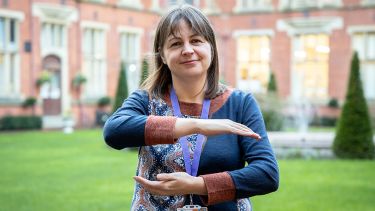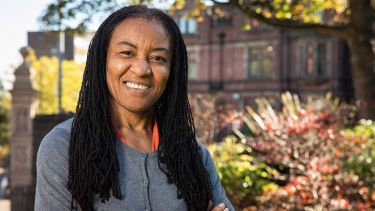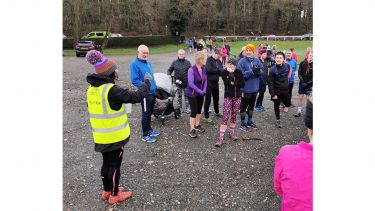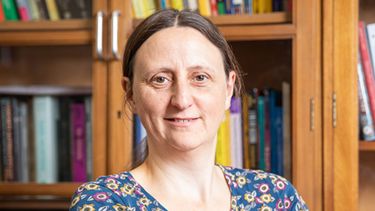Our stories
From challenging preconceptions of Muslim women, to breaking down barriers and stereotypes in mathematics, our staff are helping to build an equal world and progressing gender equality.
These profiles are a snapshot of what our community were doing at the time we spoke with them.
Equal opportunities for all: Professor Katherine Linehan
As Chair of the University's Gender Equality Committee, I take every opportunity I can to advocate for other women, particularly those early in their careers, those who work part-time and those who are carers.
"This has included encouraging a number of women, who were reticent to apply, to successfully gain promotion, working with Human Resources to ensure the new Academic Career Pathway had a mechanism to make it equitable for those who work part-time and ensuring Faculty Directors for Equality, Diversity and Inclusion across the institution were part of the recent University flagship recruitment panels.
"Locally in the Faculty of Science, this work has involved the adoption of a faculty-wide policy that all leadership roles in departments are recruited to by a transparent call for interest and interview process ensuring that opportunities for career advancement are available to all staff.
"In addition, to engender an inclusive culture in the faculty for new parents we have recently created a purpose-built parent room that offers women a private space to express and store milk or breastfeed their child close to where they work.
Professor Katherine Linehan
Former Chair of the University's Gender Equality Committee, former Faculty Director for Equality, Diversity and Inclusion and Professor of Anatomical Education.
Sharing experiences: Professor Amaka Offiah
I am progressing gender equality in my role by being an example to those I mentor and supervise as a part of my job. This includes medical, radiology and PhD students.
"I am open about telling my truth and sharing my experiences.
"I have mentored women in my field and other areas of academia who have had questions about work-life balance during studying and working, from having children and doing exams, to being in new relationships or being married.
"Because I have done all of these things myself, I am able to talk first-hand about them and I believe that my honesty and openness are appreciated.
"Sharing our experiences and talking about our truth is how we progress gender equality for all.
Professor Amaka Offiah
Chair in Paediatric Musculoskeletal Imaging and Honorary Consultant Paediatric Radiologist at ľĹÉ«ĘÓƵ Teaching Hospitals NHS Foundation Trust
Parkrun and me: Catherine McKeown
As a mother to four boys and working full-time, Parkrun is my time to recharge.
Not only am I fitter and stronger, but I also have more energy and feel better at dealing with whatever life throws at me.
"It is such a supportive community with all kinds of people turning up to run or volunteer or both. Although 54 per cent of registered park runners are women they are in a minority when it actually comes to taking part.
"Parkrun can only happen due to the amazing volunteers who ensure a safe event.
"I alternate running and volunteering in various roles including run director and I hope to encourage more women to get involved.
"You know that good feeling you get when someone says 'thank you', volunteering at Parkrun gives me that buzz every Saturday morning come rain or shine.
Catherine McKeown
Head of Financial Support, Student Support and Guidance
Breaking down barriers: Professor Sarah Whitehouse
As a pure mathematician, working in an area called algebraic topology, women are under-represented in my subject area and I am keen to break down barriers and promote gender equality in my field.
"I am part of the Women in Topology network which aims to address the gender balance in this area and one of the main activities of the network is to host a series of workshops to support and expand research efforts by female mathematicians in the field of algebraic topology.
"I was one of the organisers of the most recent workshop which brought together more than 50 senior and junior female mathematicians together at the Hausdorff Institute for Mathematics in Bonn in August 2019.
"The main Women in Topology workshops have an interesting model, bringing together senior and junior researchers including advanced graduate students to cooperate on research projects on topics of common interest. Each team produces a paper as output from the workshop.
"This model has been taken up more widely as a productive and enjoyable alternative to standard conferences.
Professor Sarah Whitehouse
Deputy Head of School of Mathematics and Statistics
Each for equal: Dr Rachael Rothman
When I was younger (this applies until at least age 20) I had no idea what I wanted to be when I 'grew up'. I liked maths, science and working out how things work, and I loved being outdoors.
"As far as I was concerned, I could be and do anything I chose when I grew up. Looking back I realise how lucky I was – no one was imposing any barriers on me and I wasn’t putting any up myself.
"Nothing was gendered – I didn’t feel like girls shouldn’t climb trees or like physics and my parents helped that by treating me and my two brothers equally.
"I never felt like I was breaking any barriers; I’m a very competitive person and I’ve always just wanted to push my own boundaries and strive to be as good as I could be, whether in sport or academic life.
I went from a state school in northeast England to study chemical engineering at Cambridge. To me, it seemed like the natural step and it was only after that I realised other people felt like I had overcome a barrier. In my first year of chemical engineering, two weeks before my exams, my director of studies told me I would not pass if I didn’t stop running (at the time I was in the British Orienteering team and training often twice a day).
"I was incensed. How could he be so short-sighted? Needless to say, I kept running every day and I achieved first-class marks.
"His negativity drove me to achieve better things. At the time I saw it as proving him wrong rather than breaking boundaries, but it was probably actually the first instance I truly felt someone else imposing a barrier on me.
"Since then there have been many other instances.
"At a big international conference as a post-doc, I was in a meeting with 15 men and one other woman. They were selecting the committee and the new chair pointed straight at me and said “What about you? You look like you’d be a good secretary”.
"I was so astounded I was speechless. The really disappointing part is that no one else in the room said anything either. The irony was that had he not said anything I would have volunteered, but after that, there was no way I was taking the role.
"This kind of mindless bias should not go unchallenged. If not challenged things will never change.
"If you had told me 20 years ago that I would now be an academic researching sustainability and leading the University sustainability activities, I would have a lovely family with two young sons, I would have a sporting career behind me and I would have just returned from a year in America and sabbatical at MIT, I would never have predicted it. But I would have thought 'yeah that sounds pretty fun'.
"Each for equal means not imposing boundaries or barriers on other people, and not allowing other people to impose boundaries or barriers on you. Take the opportunities that are presented to you, have courage in your conviction, strive to be the best you can and don’t be afraid to call out the bias of any kind.
"By working together we can make the world a more equal place.
Dr Rachael Rothman
Associate Director, Grantham Centre for Sustainable Futures
Recruitment: Lucy Brooke
"In Security Services we were significantly underrepresented by females and had justified cause for a genuine operational requirement to bring more females into the service.
"We created a campaign to attract female applicants and completely rethought our advertising process. We wanted our employees to reflect the rich diversity of our community, and we soon found ourselves with a broader applicant pool, with applicants best fitting the job description, which enabled us to employ high-quality staff.
"Having successfully run the campaign now on several occasions, we have addressed good gender balance by increasing our female staff by 120 per cent."
Lucy Brooke
Security Services





